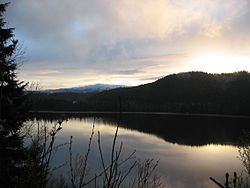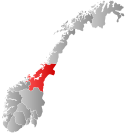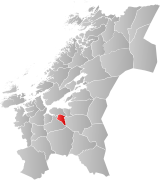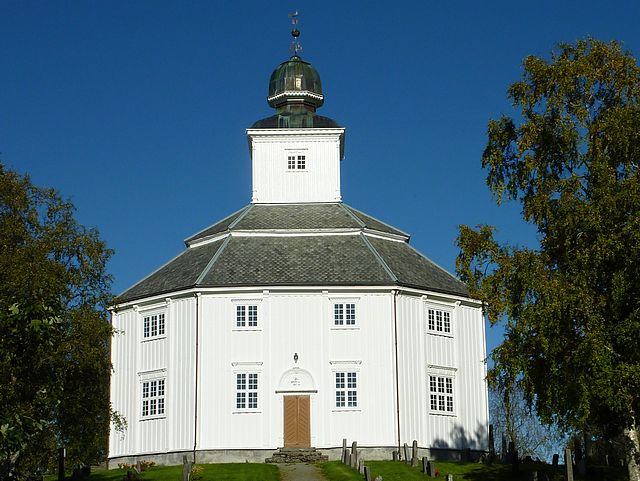Klæbu Municipality
Former municipality in Trøndelag, Norway From Wikipedia, the free encyclopedia
Klæbu is a former municipality in Trøndelag county, Norway. It existed from 1838 until its dissolution in 2020 when it was incorporated into the neighboring Trondheim Municipality. It was located in the southern part of the Trondheim Region, about 20 kilometres (12 mi) south of the city of Trondheim. The administrative center was the village of Klæbu. The other major village in Klæbu Municipality was Tanem.[5]
Klæbu Municipality
Klæbu kommune | |
|---|---|
 | |
 Trøndelag within Norway | |
 Klæbu within Trøndelag | |
| Coordinates: 63°16′34″N 10°30′51″E | |
| Country | Norway |
| County | Trøndelag |
| District | Trondheim Region |
| Established | 1 Jan 1838 |
| • Created as | Formannskapsdistrikt |
| Disestablished | 1 Jan 2020 |
| • Succeeded by | Trondheim Municipality |
| Administrative centre | Klæbu |
| Government | |
| • Mayor (2015-2019) | Kirsti Tømmervold (Ap) |
| Area (upon dissolution) | |
• Total | 186.35 km2 (71.95 sq mi) |
| • Land | 174.80 km2 (67.49 sq mi) |
| • Water | 11.55 km2 (4.46 sq mi) 6.2% |
| • Rank | #337 in Norway |
| Highest elevation | 816.7 m (2,679.5 ft) |
| Population (2019) | |
• Total | 6,076 |
| • Rank | #171 in Norway |
| • Density | 32.6/km2 (84/sq mi) |
| • Change (10 years) | +7.8% |
| Demonym | Klæbygg[2] |
| Official language | |
| • Norwegian form | Bokmål |
| Time zone | UTC+01:00 (CET) |
| • Summer (DST) | UTC+02:00 (CEST) |
| ISO 3166 code | NO-5030[4] |
At the time of its dissolution in 2020, the 186-square-kilometre (72 sq mi) municipality was the 337th largest by area out of the 422 municipalities in Norway. Klæbu Municipality was the 171st most populous municipality in Norway with a population of 6,076. The municipality's population density was 32.6 inhabitants per square kilometre (84/sq mi) and its population had increased by 7.8% over the previous 10-year period.[6][7]
Even though agriculture was traditionally the main industry for Klæbu, the municipality most recently functioned more as a commuter town of Trondheim, where many of Klæbu's inhabitants worked or attended school.
General information
Summarize
Perspective

The municipality of Klæbu was established on 1 January 1838 (see formannskapsdistrikt law). On 1 January 1899, the small northwestern part of Klæbu (population: 533) was separated from Klæbu to form the new Tiller Municipality.[8]
On 1 January 2018, the municipality switched from the old Sør-Trøndelag county to the new Trøndelag county.
On 1 January 2020, Klæbu Municipality merged with the neighboring Trondheim Municipality to the north.[9][10]
Name
The municipality (originally the parish) is named after the old Klæbu farm (Old Norse: Kleppabú) since the first Klæbu Church was built there. The first element is the plural genitive case of kleppr which means "rocky hill". The last element is bú which means "rural district". The district/parish has a lot of small rocky hills.[11]
Coat of arms
The coat of arms was granted on 8 July 1983 and it was in use until 1 January 2020 when the municipality was dissolved. The official blazon is "Argent, flaunches azure" (Norwegian: I sølv to buede blå flanker). This means the arms have a field (background) that has a tincture of argent which means it is commonly colored white, but if it is made out of metal, then silver is used. Each side of the arms have blue flaunches. The arms symbolize the Trangfossen waterfall in the Nidelva river, which is now the deepest canyon in Norway measuring 56 metres (184 ft). The river has been of great importance for the local development, for agriculture and hydroelectricity generation, hence the use of the waterfall as a typical symbol for the municipality. The waterfall is no longer visible as that part of the river became part of Bjørsjøen lake after the building of the dam at Hyttfossen. The arms were designed by Einar H. Skjervold.[12][13][14]
Churches
The Church of Norway had one parish (sokn) within Klæbu Municipality. It is part of the Heimdal prosti (deanery) in the Diocese of Nidaros.
| Parish (sokn) | Church name | Location of the church | Year built |
|---|---|---|---|
| Klæbu | Klæbu Church | Klæbu | 1790 |
| Vassfjell Chapel | Vassfjellet mountain | 1974 |
Geography
The Nidelva river flowed through Klæbu Municipality. The river was a large source of hydroelectric power with a total of 3 power stations within the municipal borders. The river runs north from the lake Selbusjøen. The mountain Vassfjellet was located along the western border with Melhus Municipality. The highest point in the municipality was the 816.7-metre (2,679 ft) tall mountain Kråkfjellet.[1]
The landlocked municipality of Klæbu had three municipalities that bordered it: Melhus Municipality to the west and south, Selbu Municipality to the east, and Trondheim Municipality to the north.
Media
The newspaper KlæbuPosten is published in Klæbu.[15]
Government
Summarize
Perspective
While it existed, Klæbu Municipality was responsible for primary education (through 10th grade), outpatient health services, senior citizen services, welfare and other social services, zoning, economic development, and municipal roads and utilities. The municipality was governed by a municipal council of directly elected representatives. The mayor was indirectly elected by a vote of the municipal council.[16] The municipality was under the jurisdiction of the Sør-Trøndelag District Court and the Frostating Court of Appeal.
Municipal council
The municipal council (Kommunestyre) of Klæbu is made up of 23 representatives that are elected to four year terms. The tables below show the historical composition of the council by political party.
| Party name (in Norwegian) | Number of representatives | |
|---|---|---|
| Labour Party (Arbeiderpartiet) | 9 | |
| Progress Party (Fremskrittspartiet) | 2 | |
| Green Party (Miljøpartiet De Grønne) | 1 | |
| Conservative Party (Høyre) | 3 | |
| Centre Party (Senterpartiet) | 3 | |
| Socialist Left Party (Sosialistisk Venstreparti) | 2 | |
| Liberal Party (Venstre) | 3 | |
| Total number of members: | 23 | |
| Party name (in Norwegian) | Number of representatives | |
|---|---|---|
| Labour Party (Arbeiderpartiet) | 8 | |
| Progress Party (Fremskrittspartiet) | 3 | |
| Conservative Party (Høyre) | 5 | |
| Centre Party (Senterpartiet) | 3 | |
| Socialist Left Party (Sosialistisk Venstreparti) | 2 | |
| Liberal Party (Venstre) | 2 | |
| Total number of members: | 23 | |
| Party name (in Norwegian) | Number of representatives | |
|---|---|---|
| Labour Party (Arbeiderpartiet) | 6 | |
| Progress Party (Fremskrittspartiet) | 5 | |
| Conservative Party (Høyre) | 3 | |
| Christian Democratic Party (Kristelig Folkeparti) | 1 | |
| Centre Party (Senterpartiet) | 3 | |
| Socialist Left Party (Sosialistisk Venstreparti) | 3 | |
| Liberal Party (Venstre) | 2 | |
| Total number of members: | 23 | |
| Party name (in Norwegian) | Number of representatives | |
|---|---|---|
| Labour Party (Arbeiderpartiet) | 5 | |
| Progress Party (Fremskrittspartiet) | 4 | |
| Conservative Party (Høyre) | 3 | |
| Christian Democratic Party (Kristelig Folkeparti) | 2 | |
| Centre Party (Senterpartiet) | 1 | |
| Socialist Left Party (Sosialistisk Venstreparti) | 8 | |
| Total number of members: | 23 | |
| Party name (in Norwegian) | Number of representatives | |
|---|---|---|
| Labour Party (Arbeiderpartiet) | 6 | |
| Progress Party (Fremskrittspartiet) | 2 | |
| Conservative Party (Høyre) | 4 | |
| Christian Democratic Party (Kristelig Folkeparti) | 2 | |
| Centre Party (Senterpartiet) | 2 | |
| Socialist Left Party (Sosialistisk Venstreparti) | 6 | |
| Liberal Party (Venstre) | 1 | |
| Total number of members: | 23 | |
| Party name (in Norwegian) | Number of representatives | |
|---|---|---|
| Labour Party (Arbeiderpartiet) | 7 | |
| Progress Party (Fremskrittspartiet) | 1 | |
| Conservative Party (Høyre) | 5 | |
| Christian Democratic Party (Kristelig Folkeparti) | 1 | |
| Centre Party (Senterpartiet) | 2 | |
| Socialist Left Party (Sosialistisk Venstreparti) | 6 | |
| Liberal Party (Venstre) | 1 | |
| Total number of members: | 23 | |
| Party name (in Norwegian) | Number of representatives | |
|---|---|---|
| Labour Party (Arbeiderpartiet) | 10 | |
| Progress Party (Fremskrittspartiet) | 1 | |
| Conservative Party (Høyre) | 5 | |
| Christian Democratic Party (Kristelig Folkeparti) | 1 | |
| Centre Party (Senterpartiet) | 3 | |
| Socialist Left Party (Sosialistisk Venstreparti) | 4 | |
| Liberal Party (Venstre) | 1 | |
| Total number of members: | 25 | |
| Party name (in Norwegian) | Number of representatives | |
|---|---|---|
| Labour Party (Arbeiderpartiet) | 11 | |
| Progress Party (Fremskrittspartiet) | 2 | |
| Conservative Party (Høyre) | 5 | |
| Christian Democratic Party (Kristelig Folkeparti) | 1 | |
| Centre Party (Senterpartiet) | 2 | |
| Socialist Left Party (Sosialistisk Venstreparti) | 2 | |
| Liberal Party (Venstre) | 2 | |
| Total number of members: | 25 | |
| Party name (in Norwegian) | Number of representatives | |
|---|---|---|
| Labour Party (Arbeiderpartiet) | 11 | |
| Progress Party (Fremskrittspartiet) | 1 | |
| Conservative Party (Høyre) | 6 | |
| Socialist Left Party (Sosialistisk Venstreparti) | 2 | |
| Liberal Party (Venstre) | 1 | |
| Joint list of the Centre Party (Senterpartiet) and the Christian Democratic Party (Kristelig Folkeparti) | 4 | |
| Total number of members: | 25 | |
| Party name (in Norwegian) | Number of representatives | |
|---|---|---|
| Labour Party (Arbeiderpartiet) | 7 | |
| Conservative Party (Høyre) | 5 | |
| Christian Democratic Party (Kristelig Folkeparti) | 1 | |
| Centre Party (Senterpartiet) | 2 | |
| Socialist Left Party (Sosialistisk Venstreparti) | 1 | |
| Liberal Party (Venstre) | 1 | |
| Total number of members: | 17 | |
| Party name (in Norwegian) | Number of representatives | |
|---|---|---|
| Labour Party (Arbeiderpartiet) | 7 | |
| Socialist Left Party (Sosialistisk Venstreparti) | 1 | |
| Joint list of the Conservative Party (Høyre), Christian Democratic Party (Kristelig Folkeparti), New People's Party (Nye Folkepartiet), Centre Party (Senterpartiet), and Liberal Party (Venstre) | 8 | |
| The Free Voters (De Frie Velgere) | 1 | |
| Total number of members: | 17 | |
| Party name (in Norwegian) | Number of representatives | |
|---|---|---|
| Labour Party (Arbeiderpartiet) | 9 | |
| Christian Democratic Party (Kristelig Folkeparti) | 1 | |
| Joint List(s) of Non-Socialist Parties (Borgerlige Felleslister) | 7 | |
| Total number of members: | 17 | |
| Party name (in Norwegian) | Number of representatives | |
|---|---|---|
| Labour Party (Arbeiderpartiet) | 7 | |
| Joint List(s) of Non-Socialist Parties (Borgerlige Felleslister) | 6 | |
| Total number of members: | 13 | |
| Party name (in Norwegian) | Number of representatives | |
|---|---|---|
| Labour Party (Arbeiderpartiet) | 8 | |
| Centre Party (Senterpartiet) | 2 | |
| Joint List(s) of Non-Socialist Parties (Borgerlige Felleslister) | 3 | |
| Total number of members: | 13 | |
| Party name (in Norwegian) | Number of representatives | |
|---|---|---|
| Labour Party (Arbeiderpartiet) | 8 | |
| Conservative Party (Høyre) | 1 | |
| Christian Democratic Party (Kristelig Folkeparti) | 1 | |
| Centre Party (Senterpartiet) | 2 | |
| Liberal Party (Venstre) | 1 | |
| Total number of members: | 13 | |
| Party name (in Norwegian) | Number of representatives | |
|---|---|---|
| Labour Party (Arbeiderpartiet) | 7 | |
| Joint List(s) of Non-Socialist Parties (Borgerlige Felleslister) | 6 | |
| Total number of members: | 13 | |
| Party name (in Norwegian) | Number of representatives | |
|---|---|---|
| Labour Party (Arbeiderpartiet) | 6 | |
| Joint List(s) of Non-Socialist Parties (Borgerlige Felleslister) | 6 | |
| Total number of members: | 12 | |
| Party name (in Norwegian) | Number of representatives | |
|---|---|---|
| Labour Party (Arbeiderpartiet) | 6 | |
| Liberal Party (Venstre) | 2 | |
| Joint List(s) of Non-Socialist Parties (Borgerlige Felleslister) | 4 | |
| Total number of members: | 12 | |
| Party name (in Norwegian) | Number of representatives | |
|---|---|---|
| Labour Party (Arbeiderpartiet) | 6 | |
| Joint List(s) of Non-Socialist Parties (Borgerlige Felleslister) | 6 | |
| Total number of members: | 12 | |
| Party name (in Norwegian) | Number of representatives | |
|---|---|---|
| Labour Party (Arbeiderpartiet) | 7 | |
| Joint List(s) of Non-Socialist Parties (Borgerlige Felleslister) | 5 | |
| Total number of members: | 12 | |
| Note: Due to the German occupation of Norway during World War II, no elections were held for new municipal councils until after the war ended in 1945. | ||
Mayors
The mayor (Norwegian: ordfører) of Klæbu was the political leader of the municipality and the chairperson of the municipal council. The following people have held this position:[34]
- 1838–1839: Hans Jørgen Darre
- 1840–1851: Lars Larsen Forseth, Sr.
- 1852–1855: Eskild Lysklæth
- 1856–1863: Nicolai Ulstad
- 1864–1867: Eskild Lysklæth
- 1868–1879: Lars Larsen Forseth, Jr. (V)
- 1880–1881: Sivert Thonstad (H)
- 1882–1887: Ludvig Lysklæth
- 1888–1892: Hannibal Hartmann
- 1892–1893: Andreas Nideng (H)
- 1894–1895: Sivert Thonstad (H)
- 1896–1904: Ole Aune (V)
- 1905–1913: Paul O. Lium (V)
- 1914–1916: Karl Ulstad (V)
- 1917–1919: Ole Halseth (Ap)
- 1920–1928: Paul O. Lium (Bp)
- 1929–1931: Ole Halseth (Ap)
- 1932–1934: John E. Nervik (Ap)
- 1935–1937: Bernt Forset (Bp)
- 1938–1941: John E. Nervik (Ap)
- 1941–1945: Torbjørn Lium (NS)
- 1945–1945: Bernt Forset (Bp)
- 1945–1945: John E. Nervik (Ap)
- 1946–1957: Johan Nervik (Ap)
- 1958–1959: Lars Bendiksvoll (Ap)
- 1960–1963: Sigurd Gjølgali (Ap)
- 1964–1967: Lars Bendiksvoll (Ap)
- 1968–1979: Reidar Fosshode (Ap)
- 1980–1983: Arild Huitfeldt (H)
- 1984–1987: Ivar Myhre (Ap)
- 1988–1989: Kai Nordseth (Ap)
- 1990–1991: Sverre Tangen (Ap)
- 1992–2007: Ivar Skei (SV)
- 2007–2015: Jarle Martin Gundersen (Sp)
- 2015–2019: Kirsti Tømmervold (Ap)
See also
References
Wikiwand - on
Seamless Wikipedia browsing. On steroids.


